人教新目标2018八年级英语上册 Unit 2 How often do you exercise Self Check习题课件
人教新目标八年级上册Unit2Howoftendoyouexercise知识点.doc

Unit 2 How often do you exercise?23.做某事的最好的方法___________________________ 24.看牙医____________________________ 25.超过,多余_________________ 26.健康的习惯________________ 27.别担心_________________ 28•旧习难改__________________________________29.频度副词的用法:(1).频度副词表示多长时间做某事一次,用在实义动词之前,系动词、助动词、情态动词之后,(2).对频度副词提问用how ofteno30.(1 )some time 一段时间,做时间状语■一how long(2)sometime adv在某个时候…when(3)some times 名词词组,“几次,几倍" ■一how many times⑷sometimes=at times有时 (一般现在时的标志词) …how often31.hard (l)adv努力地,猛烈地work hard努力工作study hard努力学习(2) adj.困难的,艰难的=difficult ♦Ifs hard/difficult for sb to do sth做某事对某人来说是困难的【特别提醒】hardly不是hard的副词形式,两者没有关系。
32.【拓展】how often/ how long / how far/ how soon 辨析33.次数的表达方法:once = one time —次twice= two times 两次三次或三次以上用:"基数词three times三次four times四次three or four times三到四次【注】:对次数提问用how many times。
help sb. (to) do sth =help sb. with sth.帮助某人做某事36.free ①adj.空闲的be free = have time有时间②adj.自由的,免费的be free to do sth.随心所欲的做某事37.full adj.忙的=busy adj.满的;充满的be full of = be filled with 充满3& least adv.最小,最少at least = not less than 至少;不少于39.health n 健康healthy adj 健康的(反[unhealthy40.although=though conj虽然,即使;不能与but连用,引导让步状语从句41.want sb. to do sth.= would like to do sth.想要某人做某事42.suchas “例如,像……一样”常常列举同类人或物中的几个例子,放在被列举的事物与前面的名词之间。
英语人教新目标八年级上册unit 2 How often do you exercise

2a Listen and Number the activities you hear.
Activities
a. 3 go to the movies b. 1 watch TV c. 5 shop d. 4 exercise e. 2 read
How often
every day once a week twice a week three times a week once a month twice a month
go to the movies
exercise
dance
read
watch TV
go shopping play the piano
1a Make a list of the weekend activities.
bc
d
e a
What do you usually do on weekends? I often go to the movies.
I usually … often … sometimes …
always …
What does he / she usually do on weekends?
He / She usually … always … sometimes … often …
What does he / she usually do on weekends?
He / She usually … always … sometimes … often …
Read the conversation in 1b and repeat the conversation with your own words. Then write it down in your exercise book.
人教新目标八年级上册Unit 2 How often do you exercise Section
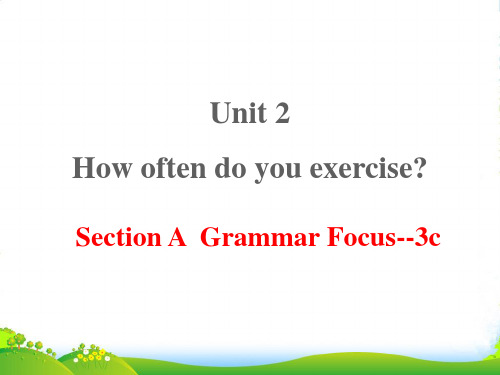
Every day
A: How often do you do your homework? B: I do my homework every day.
you:
play basketball
A: How often do you .....? B: I ..... once a week.
Unit 2 How often do you exercise?
Section A Grammar Focus--3c
always
总是
often
常常
hardly ever
几乎从不
help with housework
usually
通常
sometimes
有时
never
从不
What do you usually do on weekends? I always/often/usually/sometimes...
go to the English club twice a week
hardly ever talk with foreigners(外国人)
Report(报告 )
Hello, Everyone, I'm Lin Ying. I oftenread read English books . I do myEnglish homework every day. I sometimes sing English songs and play English games . I watch English movies once a month. I go to English Club twice a week. I hardly ever talk with foreigners . I like English.
人教新目标版英语八上Unit 2《How often do you exercise》(Period
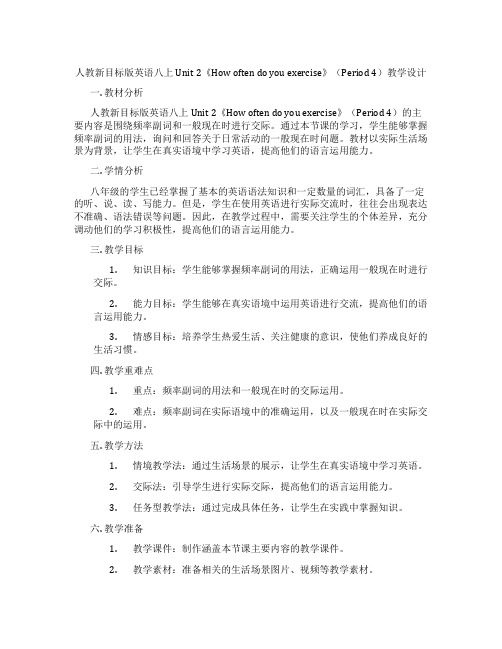
人教新目标版英语八上Unit 2《How often do you exercise》(Period 4)教学设计一. 教材分析人教新目标版英语八上Unit 2《How often do you exercise》(Period 4)的主要内容是围绕频率副词和一般现在时进行交际。
通过本节课的学习,学生能够掌握频率副词的用法,询问和回答关于日常活动的一般现在时问题。
教材以实际生活场景为背景,让学生在真实语境中学习英语,提高他们的语言运用能力。
二. 学情分析八年级的学生已经掌握了基本的英语语法知识和一定数量的词汇,具备了一定的听、说、读、写能力。
但是,学生在使用英语进行实际交流时,往往会出现表达不准确、语法错误等问题。
因此,在教学过程中,需要关注学生的个体差异,充分调动他们的学习积极性,提高他们的语言运用能力。
三. 教学目标1.知识目标:学生能够掌握频率副词的用法,正确运用一般现在时进行交际。
2.能力目标:学生能够在真实语境中运用英语进行交流,提高他们的语言运用能力。
3.情感目标:培养学生热爱生活、关注健康的意识,使他们养成良好的生活习惯。
四. 教学重难点1.重点:频率副词的用法和一般现在时的交际运用。
2.难点:频率副词在实际语境中的准确运用,以及一般现在时在实际交际中的运用。
五. 教学方法1.情境教学法:通过生活场景的展示,让学生在真实语境中学习英语。
2.交际法:引导学生进行实际交际,提高他们的语言运用能力。
3.任务型教学法:通过完成具体任务,让学生在实践中掌握知识。
六. 教学准备1.教学课件:制作涵盖本节课主要内容的教学课件。
2.教学素材:准备相关的生活场景图片、视频等教学素材。
3.作业布置:提前为学生布置相关的预习作业。
七. 教学过程1.导入(5分钟)利用图片或视频展示一些运动场景,引导学生谈论日常生活中喜欢的运动。
教师提问:“What sports do you like?”,学生回答:“I like playing basketball.”等。
人教新目标版英语八上Unit 2《How often do you exercise》(Period
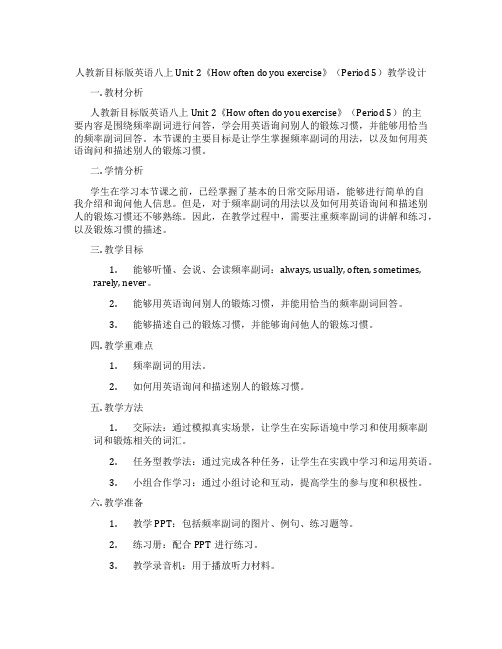
人教新目标版英语八上Unit 2《How often do you exercise》(Period 5)教学设计一. 教材分析人教新目标版英语八上Unit 2《How often do you exercise》(Period 5)的主要内容是围绕频率副词进行问答,学会用英语询问别人的锻炼习惯,并能够用恰当的频率副词回答。
本节课的主要目标是让学生掌握频率副词的用法,以及如何用英语询问和描述别人的锻炼习惯。
二. 学情分析学生在学习本节课之前,已经掌握了基本的日常交际用语,能够进行简单的自我介绍和询问他人信息。
但是,对于频率副词的用法以及如何用英语询问和描述别人的锻炼习惯还不够熟练。
因此,在教学过程中,需要注重频率副词的讲解和练习,以及锻炼习惯的描述。
三. 教学目标1.能够听懂、会说、会读频率副词:always, usually, often, sometimes,rarely, never。
2.能够用英语询问别人的锻炼习惯,并能用恰当的频率副词回答。
3.能够描述自己的锻炼习惯,并能够询问他人的锻炼习惯。
四. 教学重难点1.频率副词的用法。
2.如何用英语询问和描述别人的锻炼习惯。
五. 教学方法1.交际法:通过模拟真实场景,让学生在实际语境中学习和使用频率副词和锻炼相关的词汇。
2.任务型教学法:通过完成各种任务,让学生在实践中学习和运用英语。
3.小组合作学习:通过小组讨论和互动,提高学生的参与度和积极性。
六. 教学准备1.教学PPT:包括频率副词的图片、例句、练习题等。
2.练习册:配合PPT进行练习。
3.教学录音机:用于播放听力材料。
4.教学视频:用于播放相关场景的视频。
七. 教学过程1.导入(5分钟)通过播放一段关于人们锻炼的视频,引导学生谈论人们的锻炼习惯。
教师提问:“How often do you exercise?”,让学生用中文回答,同时板书频率副词:always, usually, often, sometimes, rarely, never。
人教版新目标八年级上unit2课件、教案Unit_2_How_often_do_you_e
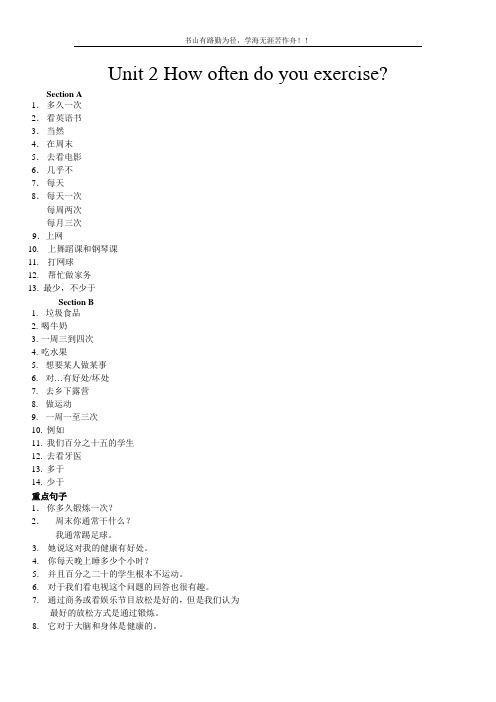
书山有路勤为径,学海无涯苦作舟!!Unit 2 How often do you exercise?Section A1.多久一次2.看英语书3.当然4.在周末5.去看电影6.几乎不7.每天8.每天一次每周两次每月三次9.上网10. 上舞蹈课和钢琴课11. 打网球12. 帮忙做家务13. 最少,不少于Section B1.垃圾食品2.喝牛奶3.一周三到四次4.吃水果5.想要某人做某事6.对…有好处/坏处7.去乡下露营8.做运动9.一周一至三次10.例如11.我们百分之十五的学生12.去看牙医13.多于14.少于重点句子1.你多久锻炼一次?2.---周末你通常干什么?---我通常踢足球。
3. 她说这对我的健康有好处。
4. 你每天晚上睡多少个小时?5. 并且百分之二十的学生根本不运动。
6. 对于我们看电视这个问题的回答也很有趣。
7. 通过商务或看娱乐节目放松是好的,但是我们认为最好的放松方式是通过锻炼。
8. 它对于大脑和身体是健康的。
难点1._______ 是对表示频度的时间状语的提问,可翻译为“多久一次”。
_________多远,________多少(接可数名词),__________多少(接不可数名词),________多久后(将来时中对含in….的词组的提问,如He will come back in three weeks.),__________(年龄)多大。
2. exercise 作动词时,可做_______动词,如He exercises every day. 也可作__________动词,如:She exercises her dog every day. 作名词时,意为“锻炼、运动”时是_________名词,意为”体操,练习题”时是_________名词。
2. 想要某物_____________________ 想要做某事____________________想要某(人)不做某事____________________3. 对…有益处/害处____________________ 对…好______________________ 擅长…______________________4. 对某人来说做某事…. ______________________________________________.5.做某事最好的方法__________________________/_____________________6.通过某种方式用介词______,其后如果是动词要用_________形式。
人教新目标版英语八上Unit 2《How often do you exercise》(Period

人教新目标版英语八上Unit 2《How often do you exercise》(Period 3)教学设计一. 教材分析人教新目标版英语八上Unit 2《How often do you exercise》第三课时,主要围绕频率副词进行问答,引导学生学会在适当的情境中询问和描述别人的锻炼习惯。
本课时通过听力、口语、阅读和写作等多种形式,让学生在实际语境中运用频率副词,提高他们的语言运用能力。
二. 学情分析学生在学习本课时已经掌握了基本的日常交际用语,具备一定的听说读写能力。
但部分学生在实际运用频率副词时,可能会出现混淆和错误。
因此,在教学过程中,教师需要关注学生的个体差异,有针对性地进行辅导。
三. 教学目标1.知识目标:学生能够掌握频率副词的用法,正确询问和描述别人的锻炼习惯。
2.能力目标:学生能够在实际情境中运用频率副词,提高口语交际能力。
3.情感目标:培养学生热爱锻炼、养成良好的生活习惯。
四. 教学重难点1.重点:频率副词的用法和实际运用。
2.难点:在特定情境中,正确运用频率副词进行问答。
五. 教学方法1.任务型教学法:通过设置各种实际情境,让学生在完成任务的过程中运用频率副词。
2.交际法:引导学生进行角色扮演、小组讨论等互动活动,提高口语交际能力。
3.情境教学法:创设生活情境,让学生在实际语境中学习、运用频率副词。
六. 教学准备1.教学材料:人教新目标版英语八上教材、多媒体设备。
2.教学辅助材料:录音机、磁带、课件。
3.教学场地:教室。
七. 教学过程1.导入(5分钟)教师通过提问学生日常生活中喜欢的运动,引导学生谈论锻炼习惯,为新课的学习营造轻松愉快的学习氛围。
2.呈现(5分钟)教师展示本课时的图片,引导学生观察并说出图片中人物的锻炼方式。
然后教师提问:“How often do they exercise?”,让学生回答。
3.操练(10分钟)教师播放录音,学生跟读并模仿语音语调。
人教新目标八年级英语上册教案Unit2Howoftendoyo

福建省高级人民法院印发《福建法院在线调解工作规范》的通知文章属性•【制定机关】福建省高级人民法院•【公布日期】2020.10.09•【字号】闽高法〔2020〕78号•【施行日期】2020.10.09•【效力等级】地方司法文件•【时效性】现行有效•【主题分类】调解正文福建省高级人民法院印发《福建法院在线调解工作规范》的通知闽高法〔2020〕78号全省各级人民法院、厦门海事法院、平潭综合实验区人民法院、福州铁路运输法院,本院各部门:现将《福建法院在线调解工作规范》印发给你们,请结合实际认真贯彻执行。
执行中遇到的问题,请及时报告我院。
福建省高级人民法院2020年10月9日福建法院在线调解工作规范为进一步完善一站式多元解纷机制,规范在线调解工作,根据最高人民法院《关于人民法院进一步深化多元化纠纷解决机制改革的意见》《关于人民法院特邀调解的规定》《关于人民法院深化“分调裁审”机制改革的意见》《关于建设一站式多元解纷机制一站式诉讼服务中心的意见》等规定,结合我省法院在线调解工作实际,制定本规范。
一、总则第一条 [在线调解]在线调解是指与人民法院建立诉调对接关系的特邀调解组织、特邀调解员、法院专职调解员,通过在线调解平台开展的调解,是一种高效、便捷、实时的现代化矛盾纠纷解决方式。
第二条 [在线调解平台]本规范所称的“在线调解平台”,是指人民法院建设或认可的各类依托信息技术实现调解资源整合,具备远程音视频调解及录音录像、在线委派、委托调解、在线生成调解协议、在线申请司法确认等功能的网站、系统及其他信息化载体。
第三条 [平台对接]推动在线调解平台与其他部门、行业调解平台对接,实现信息互联互通、矛盾纠纷网上处理。
第四条 [基本原则]在线调解应当遵循下列原则:(一)自愿平等。
尊重当事人意志,平等对待当事人;(二)便捷高效。
提升诉讼服务,方便纠纷解决;(三)诚实信用。
如实陈述矛盾纠纷,不得进行虚假调解;(四)合法依规。
人教新目标八年级上册英语《Unit 2 How often do you exercise?》Sec
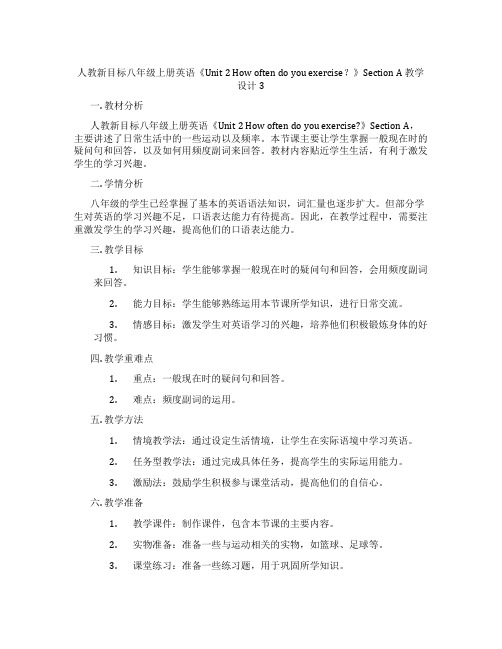
人教新目标八年级上册英语《Unit 2 How often do you exercise?》Section A 教学设计3一. 教材分析人教新目标八年级上册英语《Unit 2 How often do you exercise?》Section A,主要讲述了日常生活中的一些运动以及频率。
本节课主要让学生掌握一般现在时的疑问句和回答,以及如何用频度副词来回答。
教材内容贴近学生生活,有利于激发学生的学习兴趣。
二. 学情分析八年级的学生已经掌握了基本的英语语法知识,词汇量也逐步扩大。
但部分学生对英语的学习兴趣不足,口语表达能力有待提高。
因此,在教学过程中,需要注重激发学生的学习兴趣,提高他们的口语表达能力。
三. 教学目标1.知识目标:学生能够掌握一般现在时的疑问句和回答,会用频度副词来回答。
2.能力目标:学生能够熟练运用本节课所学知识,进行日常交流。
3.情感目标:激发学生对英语学习的兴趣,培养他们积极锻炼身体的好习惯。
四. 教学重难点1.重点:一般现在时的疑问句和回答。
2.难点:频度副词的运用。
五. 教学方法1.情境教学法:通过设定生活情境,让学生在实际语境中学习英语。
2.任务型教学法:通过完成具体任务,提高学生的实际运用能力。
3.激励法:鼓励学生积极参与课堂活动,提高他们的自信心。
六. 教学准备1.教学课件:制作课件,包含本节课的主要内容。
2.实物准备:准备一些与运动相关的实物,如篮球、足球等。
3.课堂练习:准备一些练习题,用于巩固所学知识。
七. 教学过程1.导入(5分钟)利用课件展示一些运动的图片,如篮球、足球、游泳等,引导学生说出这些运动的名称。
然后提问:“Do you often exercise? Why?”,让学生谈论自己是否经常锻炼以及原因。
2.呈现(10分钟)展示教材中的插图,让学生观察并回答:“How often do they exercise?”,引导学生学会用一般现在时提问。
人教新目标八年级英语上册教案Unit2Howoftendoyo11
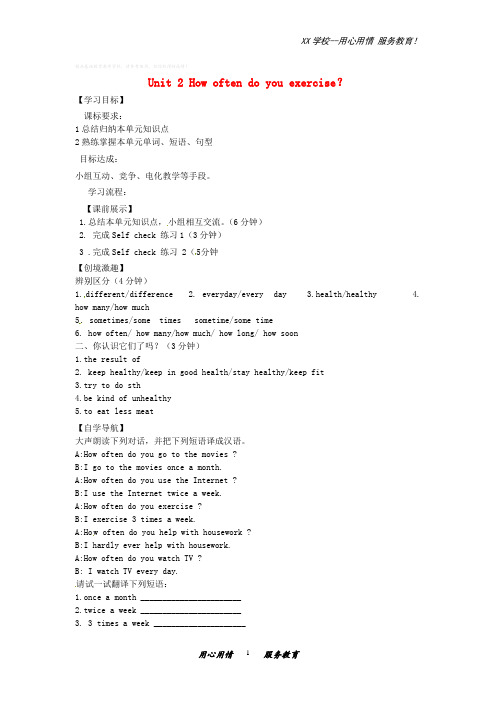
精品基础教育教学资料,请参考使用,祝你取得好成绩!Unit 2 How often do you exercise?【学习目标】课标要求:1总结归纳本单元知识点2熟练掌握本单元单词、短语、句型目标达成:小组互动、竞争、电化教学等手段。
学习流程:【课前展示】1.总结本单元知识点,小组相互交流。
(6分钟)2. 完成Self check 练习1(3分钟)3 .完成Self check 练习 2(5分钟【创境激趣】辨别区分(4分钟)1.different/difference2. everyday/every day3.health/healthy4. how many/how much5. sometimes/some times sometime/some time6. how often/ how many/how much/ how long/ how soon二、你认识它们了吗?(3分钟)1.the result of2. keep healthy/keep in good health/stay healthy/keep fit3.try to do sth4.be kind of unhealthy5.to eat less meat【自学导航】大声朗读下列对话,并把下列短语译成汉语。
A:How often do you go to the movies ?B:I go to the movies once a month.A:How often do you use the Internet ?B:I use the Internet twice a week.A:How often do you exercise ?B:I exercise 3 times a week.A:Ho w often do you help with housework ?B:I hardly ever help with housework.A:How often do you watch TV ?B: I watch TV every day.请试一试翻译下列短语:1.once a month _______________________2.twice a week _______________________3. 3 times a week _____________________4.hardly ever _________________________5.every day __________________________【合作探究】你还能写出多少?(5分钟)Example: go skateboardingGo_____________Go_____________go_____________go _____________go_____________go_____________go_____________go______________【展示提升】典例分析知识迁移用所给词的适当形式填空(3分钟)1.Good food and exercise help me to study ______(well).2.You must ______(try)_____(eat)_____(little) .3._____(eat) vegetables is good for our ______(health).4.He is pretty _____(health) because he _____(exercise) every day.5.They are ______(different).What are the _____(different) between them.句型转换(5分钟)1.Lucy usually cleans the room every two days.(画线提问)_____ ____ _____ Lucy usually clean the room?2.The little girl relaxes ten hours eve ry day. (画线提问)______ _____ does the little girl ____ every day ?3.His favorite sports is skateboarding.(同义句)He _____ skateboarding _____.4.The old man doesn’t want to eat anything. (同义句)The old man ______ to eat______.5.He does morning exercises every morning . (画线提问)_____ does he_____ every morning.【强化训练】根据汉语完成英语,每空一词。
人教版新目标英语八年级上Unit2HowoftendoyouexerciseSectionA1a2c

人教版新目标英语八年级上Unit 2 How often do you exercise?Section A ,1a-2c 教案一.教材分析本单元的语言目标是表达“频率”。
以“How often do you exercise?” 为话题展开教学活动。
Section A通过“谈论做运动的频率”,通过听力、对话练习、小调查等方式帮助学生掌握如何询问及表达有关频率的内容(做运动的频率,日常活动的频率,学习的频率等)。
根据教材,首先要让学生学习描绘生活中课余活动中的短语表达,再学会使用频率副词,再通过听力和小对话小调查等活动练习使用频率副词描述课余时间的活动安排,为后面讨论健康生活方式做好语言知识上的准备。
二、学情分析经过七年级的英语学习,大多数学生有了一定的语言积累,也有了一定的英语表达能力。
但是很多学生学习英语一大问题就是不爱开口说英语,在英语对话和小组活动中极易偷懒,所以就需要尽量把活动难度降低,把活动与学生的生活结合,让学生积极主动地参与进来,而本课的活动中,学生在七年级已经学过了一些关于活动的动词短语,例如watch TV等,同时这个话题与学生的日常活动密切相关,容易引起学生参与的热情,那么在后面的教学活动中,学生就可以积极参与,合作,从活动中感知频率副词的使用。
三、教学目标分析1. 语言知识目标A.学生能恰当使用always, usually, often, sometimes, hardly ever, never, once a week等频率副词来表达日常活动的频率。
B.掌握并运用以下句型进行顺畅的对话:What do you usually do on weekends? I always exercise.What does she do on weekends? She sometimes goes shopping.How often do you go to the movies? I go to the movies once a monthHow often does he watch TV? He hardly ever watches TV.(2) 技能目标学生能听懂并会用how often来描述课余时间的活动。
人教版新目标八年级上册Unit-2-How-often-do-you-exercise-Sectio
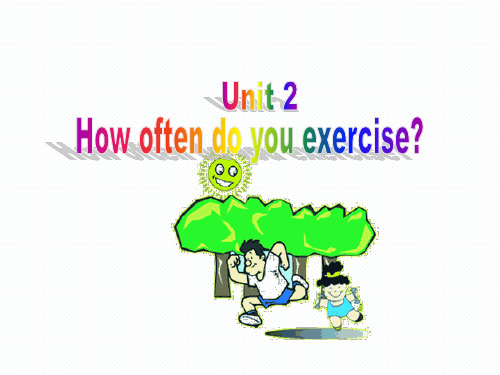
Doctors want us to … every day. Because …are…
be good / bad for health Coffee is bad for our health.
potato chips =French fries
be good/ bad for health
Words preview
junk 废弃的旧物;破烂物 junk food 垃圾食品
milk 牛奶 coffee 咖啡
chip (食物等的) 薄片 cola 可乐
Words preview
chocolate 巧克力 drink 喝;饮 health 健康;健康状况
how many 多少 interviewer 采访者
-- Although it’s bad for our health, I love it. I eat it once or twice a week.
Make up your own conversations.
--How often do you eat junk food?
-- I eat junk food once a month.
Doctors want us to eat …every day. Doctors want us to drink …every day.
Doctors want us to … every day. Because … is good for our health.
Doctors want us to … every day. Because …is good for our health.
nine
every day never
2018年秋八年级英语上册Unit2Howoftendoyouexercise复习课件新版人教新目标版

03
考点集训
频度副词
1. 频度副词的含义 (1) 表示次数、频率的副词称为频度副词。常用的频度副词按频率发生的高低依次为 always > usually>often>sometimes>seldom>hardly ever>never。 John always comes late.约翰总是迟到。 He hardly ever exercises.他几乎不锻炼。
I can hardly say a word.我几乎说不出一句话来。
03
考点集训
(2)有些频度副词也可位于句首,但表示不同的含义。 ①sometimes常用于句首,和位于句中区别不大。 Sometimes Jack plays computer games.杰克有时玩电脑游戏。 ②often用于句首时,通常表示强调,且其前一般有quite,very修饰。 Very often he goes online.他经常上网。
Unit 2 How often do you exercise?
Revision
C
目录 ONTENTS 01 02 03 04 05
单元复习目标 单元词汇听写 单元考点集训
单元话题训练
单元实战演练
01
复习目标
1. 熟练掌握本单元的重点词汇和短语。
2. 熟练掌握本单元的语法点。 3. 熟练掌握本单元的话题写作。
03
考点集训
(1)every+名词单数 every morning/afternoon/evening/day/Sunday/weekend/ week/ month/term/year/… (2)次数+一段时间 once a day / twice a week / once or twice a year / two or three times (3)频度副词 always(100%)---usually(90%)---often(60%)--sometimes(30%)---hardly ever(10-20%)---never(0%)
(人教新目标)八年级上册英语 Unit 2 How often do you exerciseSec

Unit 2 How often do you exercise?Section A (1a-2d)教学目标【语言知识目标】1) 能掌握以下单词:housework, hardly, ever, hardly ever, once, twice, Internet,program, full, swing, swing dance2) 能掌握以下句型:①—What do you do on weekends? —I usually watch TV.②—How often do you watch TV? —I watch TV every day.③—Do you go shopping? —No, I never go shopping.【技能目标】能恰当运用频度副词及短语描述自己的课外活动。
【情感态度价值观目标】通过本课的学习,合理安排日程活动,培养学生良好的生活习惯和饮食习惯。
教学重难点【教学重点】1) 对6个频度副词细微差异的理解及使用。
2) 弄清一般现在时在不同人称下动词形式及提问的变化。
【教学难点】1) 谈论课余时间的各项活动,初步认识和使用频度副词。
教学过程Step 1. Lead-inTalk about your weekend’s activities.Step 2. Presentation(1) Teacher asks:“What do you usually do on weekends? ” (Write on the blackboard)Ss: I usually …… on weekends.1.Teacher shows some cards:watch TV read books exercise play footballgo shopping go to the movies.(3)Let Ss answer according to cardsTeacher reads aloud and Ss read follow teacher.Step 3. Writing(1) Look at the picture. Discuss with your partners. Make a list of the weekend activities. (2) Let some Ss read out their activities. Let other Ss add more activities.step4.Presentation(1) Show the words on the big screen.always (100%) usually(80%) often (60%)sometimes (20%) hardly ever(5%) never (0%)(2) Game 比一比,看谁说得又快又好?(3) Work in pairs(4) 总结频度副词 : 频度副词通常放在be动词、助动词或情态动词之后,行为动词之前。
人教新目标八年级英语上册教案Unit2Howoftendoyo
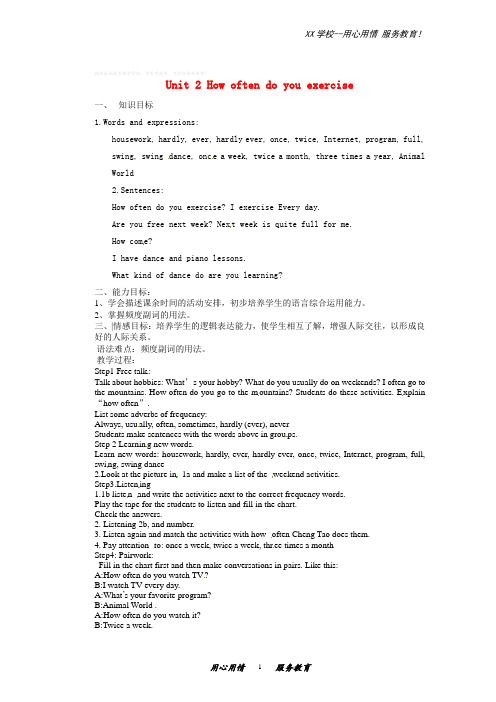
精品基础教育教学资料,请参考使用,祝你取得好成绩!Unit 2 How often do you exercise一、知识目标1.Words and expressions:housework, hardly, ever, hardly ever, once, twice, Internet, program, full, swing, swing dance, onc e a week, twice a month, three times a year, Animal World2.Sentences:How often do you exercise? I exercise Every day.Are you free next week? Nex t week is quite full for me.How com e?I have dance and piano lessons.What kind of dance do are you learning?二、能力目标:1、学会描述课余时间的活动安排,初步培养学生的语言综合运用能力。
2、掌握频度副词的用法。
三、|情感目标:培养学生的逻辑表达能力,使学生相互了解,增强人际交往,以形成良好的人际关系。
语法难点:频度副词的用法。
教学过程:Step1 Free talk:Talk about hobbies: What’s your hobby? What do you usually do on weekends? I often go to the mountains. How often do you go to the m ountains? Students do these activities. E xplain “how often”.List some adverbs of frequency:Always, usu ally, often, sometimes, hardly (ever), neverStudents make sentences with the words above in grou ps.Step 2 Learnin g new words.Learn new words: housework, hardly, ever, hardly ever, once, twice, Internet, program, full, swi ng, swing dance2.Look at the picture in1a and make a list of the weekend activities.Step3.Listen ing1.1b liste n and write the activities next to the correct frequency words.Play the tape for the students to listen and fill in the chart.Check the answers.2. Listening 2b, and number.3. Listen again and match the activities with how often Cheng Tao does them.4. Pay attention to: once a week, twice a week, thr ee times a monthStep4: Pairwork:Fill in the chart first and then make conversations in pairs. Like this:A:How often do you watch TV?B:I watch TV every day.A:What’s your favorite program?B:Animal World .A:How often do you watch it?B:Twice a week.Step5: Role-play1.Let the students read the conversation in 2d and m at ch the activity withthe right time.dance lesson ---------Mondaypiano lesson----------Wednesday and Fridayplay tennis------------Tuesday2.Pl ay the tape for the students to listen and repeat.3.Read by themselves an d find out difficulties.4.Exp lain some difficult points:(1)Next week is quite full for me.(2)How come?(3)I have dance and piano lessons.(4)What kind of dance do are you learning?5.Role-play the conversation in pairs.Step6 Summary1.Some adverbs of freque ncy : Always, usually, often, sometimes, hardly (ever),never2.Next week is quite full for me.3.How come?4.4.I have…lessons.5.What kind o f …6. use the internet7.three times a weekStep7 Test完成句子:1. --What do you usually do on w_________? --I often watch TV.2. --How often does she shop? --O_____ or t_____ a week.3. Grandpa is pretty healthy because he e_________ every day.4. Animal World is my favorite TV p___________.5. The weather here is so cold, I can h______ stand it.6. These two pictures have no __________(区别).7. ________ (虽然) Mr. White is very old, he goes to work every day.8. Do you have a ________(健康) lifestyle?9. The old man ________(锻炼) every morni ng.10. I often _______ (购物) on weekends.教学后记:。
人教新目标八年级英语上册教案Unit2Howoftendoyo

精品基础教育教学资料,请参考使用,祝你取得好成绩!Unit 2 How often do you exercise?Section A (1a-1c)一、教学目标1.Knowledge objects.(知识目标)Name of activities.Adverbs of frequency.What do you usually do on weekends?I often go to the movies.2.Ability objects.(活动目标)Writing skill.Listening skill.Communicative competence3.Moral object.(情感目标)Keep a diary every day in English.二、教学重点1. Words: exercise, skateboard, hardly, ever,2. Phrases: how often, on weekends, go to the movies, exercise, go skateboarding, always, usually, often , never , hardly ever , sometimes .3. Sentence: What does she /he do on weekends? She often goes to the movies.三、教学难点1. Watching TV, reading, shopping skateboarding, exercising2. Always, usually, often, sometimes, hardly ever, never3. What does she do on weekends?She often goes to the movies.四、教学过程Step 1 GreetingSummer vacation is over. I think you had a wonderful vacation, am I right? Did you enjoy your summer vacation? Could you please tell us what you did in your summer vacation?2. Encourage students to share their holidays with the whole class.Step 2 Leading – inOh, you had a happy and colorful vacation. Today we will talk about more activities on weekends. First, let’s think about what we can do on weekends. I often sing on weekends, what do you usually do on weekends? What does she usually do on weekends? What about you? What does he usually do on weekends? (Ask more students in the same way)Step 3 1aLook at the screen. Make a list of the different weekend activities. Now work in pairs, ask and answer.---What does he/she do on weekends?--- She goes shopping. / She reads books. / He exercises. / He watches TV. / She goes skateboarding.Step 4 1bListen and write the letters from the picture above on the lines below.Get students to focus on the six adverbs in activity 1b and help students to understand:Always-100% usually- 90% often-80% sometimes-50% hardly ever-10% never-0%Step 5 1cFirst ask two students to read the sample in speech bubbles.What do you usually do on weekends?I often go to the movies.Step 6 SummaryThis class we’ve learnt some names of activities: watching TV, reading, skateboarding, exercising, and shopping. And we also leant some adverbs of frequency: always, usually, often, sometimes, hardly, ever, never.Step 7 Homework:1. Memories the adverb of frequency2. Make conversations with “what do you do…”Section A (2a-grammar focus)一、教学目标1. Knowledge objects.(知识目标)Name of activities.Adverbs of frequency.How often do you watch TV?I watch TV every day.What’s your favorite program?It’s Animal World.2. Ability objects(活动目标)Writing skill.Listening skill.Communicative competence3. Moral object(情感目标)Keep a diary every day in English.二、教学重点1. Words: once, twice, time, surf, Internet, program2. Phrases: Every day, once a week, twice a week, three times a week, once a month, twice a month, watch TV, surf the Internet, read English books, go to the movies3. Sentence:How often do you watch TV?I watch TV every day.What’s your favorite program?It’s Animal World.三、教学难点1. Every day, once a week, twice a week, three times a week, once a month, twicea month.2. Watch TV, surf the Internet, read English books, go to the movies.3. How often do you watch TV?I watch TV every day.What’s your favorite program?It’s Animal World.四、教学过程Step 1 GreetingGreet the class and check the homework.Step 2 RevisionWhat do you usually do on weekends?What does he/she usually do on weekends?How often do you do that?Step 3 Teach the new wordsStep 4 Lead-in1. I always read English books on weekends.I usually exercise on weekends.I often go to visit my grandparents.I sometimes go shopping on weekends.I hardly ever play computer games on weekends.I never play cards on weekends.What does your English teacher do on weekends?2. I exercise every day. I go shopping once a week. I watch TV twice a week. I go dancing t hree times a month…How often does your English teacher exercise/ go shopping / watch TV / go dancing? Step 5 2aListen. Cheng is talking about how often he does different activities. Number the activities you hear (1-5).Check the answers.Step 6 2bListen again. How often does Cheng do the activities above? Match his activities with the number of the times he does them.Check the answers.Step 7 2cHow often do you do these activities?Fill in the chart and make conversations.Learn these activities: watch TV, surf the Internet, read English books, go to the movies, exercise.Ask: How often do you …E.g. How often do you watch TV?I watch TV every day.What’s your favorite program?It’s Animal World.How often do you watch t?Every day.Step 8 Grammar focusAsk some one to read and translate it.Complete 3a & 3b, then check the answers.Find of the best student. Complete 3c.Step 9 Summary and homework1. Do exercises on pages 1-2 of the workbook to practice the language presented in this unit.2. Remember what we learn today.3. Write a passage about what you often do on weekends and how often you do different activities.Section B一、教学目标1. Knowledge objects(知识目标)New wordsHow often do you drink milk, Liu Fang?I drink milk every day.Do you like it?No. But my mother wants me to drink it. She says it’s good for my health.2. Ability objects(活动目标)Writing skill.Listening skill.Communicative competence3. Moral object(情感目标)Help them with how to keep healthy.二、教学重点1. Words: Junk, food, milk, fruit, vegetables, sleep, interviewer, healthy2. Sentences:-How often do you drink milk?-I drink milk every day.-How often do you exercise?-I exercise every day.-How many hours do you sleep every night?-Nine.三、教学难点Listening:-How often do you drink milk?-I drink milk every day.-How often do you exercise?-I exercise every day.-How many hours do you sleep every night?-Nine.四、教学过程Step 1 GreetingGreet the class and check the homework.Step 2 wordsShow the new words on the screen and teach the new words. Ask students to repeat them. And make sure everyone knows the meanings.Step 3 Section B 1aNow open your books at page 12. Look at Activity 1a.First I’ll read each word. Please read after me.Junk food/Milk/Fruit/Vegetables/SleepThere are vegetables on the plate.Step 4 1b Pair workAsk some pairs to present some questions and answer to the class.Step 5 1cNow you’ll hear a reporter interview two people. Tina and Bill.Play the recording the first time. Students only listen. Then play it again. This time asks students to circle Yes, No or I don’t know.Step 6 1dFirst read the questions in the chart to the class.How often do you exercise?How often do you eat vegetables?How often do you eat fruit?How many hours do you sleep every night?How often do you drink?How often do you eat junk food?Check the answersStep 7 1e Pair workRead the sample in speech bubbles to the class first.Interviewer: How often do you exercise?Katrina: I exercise every day.Interviewer: And How of ten do you …?Step 8 Summary and HomeworkThis class we’ve leant some words and leant to interview somebody with the sentence, how often…? After class please give more practice.Step 9 2aComplete 2a.Find out how often the Ss do these activities.Read the article. 2b.Complete the pie charts on page 14.Step 11 2cRead the article again, and then complete the questions on 2c.Step 12 2dComplete 2d.Ss understand the difference of always, usually and sometimes.Step 12 2ePair work. Choose a new partner .Use the words in Activity 2e to make conversations. Share the students’ conversations.Step 13 3aNow you will rend the chart and complete the reporter on 3a.Check the answers.Read the article.Ask the Ss’ good habits and bad habits.Step 14 3bComplete 3b.Ss use the expressions like always, every day, twice a week and never.Step 15 3c3c. White a report about the Ss’ good and bad habits. They can use the report in 3a as an example.Step 16 4Take the health quiz in 4. Compare the results with the partner’s.Find out who is the healthiest in our class.Tell the Ss some information about how to become healthier.HomeworkWhite a report about your good and bad habits..Self Check1. Knowledge objects(知识目标)Vocabulary in this unit.Writing practice using the target language in this unit.2. Ability objects(活动目标)Writing skill.Communicative competence3. Moral object(情感目标)Keep a diary every day in English.二、教学重点Vocabulary in this unit.三、教学难点Writing practice using the target language in this unit.四、教学过程Step 1 GreetingGreet the class and check the homework.Step 2 Shelf Check 1Complete the chart. What about your parents? You can use these words: often every day usually always hardly ever neverStep 3 Shelf Check 2Write five sentences using the information above.Step 4 Shelf Check 3Complete the conversation.Step 5 HomeworkIf time doesn’t permit, leave some exercises of workbook as homewor k.。
